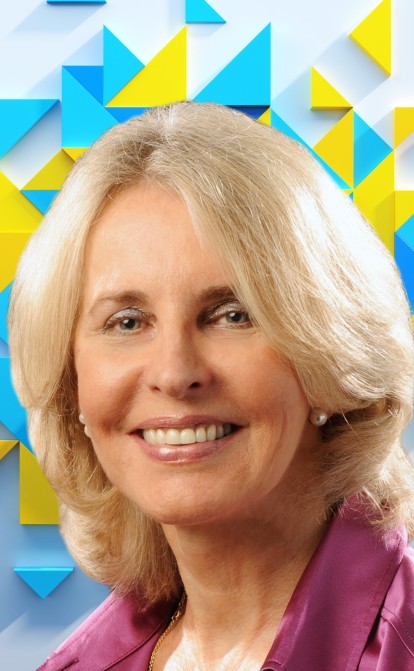Forbes proposed American and Ukrainian politicians, top managers, volunteers, paramedics, diplomats and actresses to write an essay on what modern female leadership is. In the last twenty or so years, women leaders are no longer afraid of being women, allows the contributor of The Washington Post Sally Quinn
Покупайте годовую подписку на шесть журналов Forbes Ukraine по цене четырех. Если вы цените качество, глубину и силу реального опыта, эта подписка именно для вас.
Some years ago after the Czechoslovakian Velvet Revolution in which Vaclav Havel became President, there was a dinner at the Czech Embassy given by the young Ambassador Michael Zantovsky, a former journalist.
It was a very high-powered group with members of the Senate and House, White House officials, diplomats, journalists and the military.
At one point I was standing talking to Andrea Mitchell, a well known TV anchor woman, Judy Woodruff, another distinguished TV anchor and Secretary of State Madeleine Albright.
We were deep in discussion when a member of the administration approached us.
«Well», he asked cautiously. «This looks very serious. What are you talking about?». Without missing a beat, Madeleine replied, to his dismay: «Clothes, hair and make up».
I thought then, and I think now, that that may have been the beginning of another Velvet Revolution.
I have found, in the last twenty or so years, that women leaders are no longer afraid of being women. There was a period, after the women’s movement began in the United States, where many women leaders were so unsure of their positions that they felt they had to dress like men and act like men.
There were women who didn’t marry, didn’t have children, and gave up relationships to concentrate on their careers, assuming that they would be more acceptable as leaders, as managers if they were unencumbered with family.
Even if they had families, they didn’t talk about it. They were careful to discuss only serious issues if they were to be taken seriously, if they were going to play with the big boys. Only «wives» talked about their children.
It’s no longer news that women leaders are competent and effective. Yes, we know that women are more empathetic, more compassionate and better listeners. We also know that they carry the brunt of family duties, no matter what anyone says.
In the early days of feminism, women were encouraged to demand that their husbands or partners sign contracts saying they would do half of the cleaning, bedmaking, dishwashing and childcare. Ha! We all know how that worked out.
Gradually, as women began to accrue more power and higher positions, that began to change. Certainly among those few women who made it.
Today the women leaders I know are so much more relaxed about their femininity, so much more confident of their roles, so much more accepted as leaders that they are beginning to look and act like women.
Nancy Pelosi, the former Speaker of the House and undeniably the most powerful, has become THE role model for aspiring women, no matter what their profession is, everywhere. Interestingly, she wields her power through clothes and hair and shoes, a soft-spoken voice, and famous smile, as well as her iron will which is formidable.
Nobody messes with Nancy Pelosi.
Nancy Pelosi is also a mother of five. (And yes, it’s ok to say that now even if you don’t describe men that way because we all know that mother of five is different from father of five).
Last year I saw her at an event where she had to make a speech, attend a cocktail party and then be on a plane at 6am to Europe for a meeting with world leaders. She had just come in From San Francisco on the red eye (the overnight plane) where she had been giving another speech. Her hair perfect, wearing an elegant pantsuit and 4-inch heels, she reeled off her family’s plans for Thanksgiving, including meals she had arranged for three days.
Katharine Graham, (mother of four) was the late owner and publisher of the Washington Post and a close friend. I watched her metamorphosis from shy widow to one of the most powerful women in the world as she worked her way through the uncertain years of the paper with only men, sometimes disparaging, at her side.
She triumphed in the end, overseeing the Watergate coverage which resulted in the resignation of President Richard Nixon, even volunteering to go to jail in place of reporters if it came to that.
I saw Sandra Day O’Connor, the first woman on the United States Supreme Court, (mother of three) also a friend, give up her seat on the Supreme Court to care for her husband John who had Alzheimer’s disease.
Women leaders have had much to overcome, as they didn’t have the advantage of being able to network the way men did. There were so few women in power that there was nobody to network with. While men were out having business golf dates and going to the gym and watching sports together (never talking about personal issues), women were relegated to lunches and teas.
It wasn’t a waste of time. It only made them more effective. They learned a lot more about other human beings, what people’s concerns were, and how to relate to the everyday issues that affect their lives.
What I find with most women leaders I know today is that they are comfortable in their own skin, which has not always been the case. They are secure in what they do and happy with who they are. If they want to wear pants suits and sneakers, fine. If they want to wear high heels and skirts, also fine.
Make up and hair are no longer defining women these days. Nor are management styles. Where tough women were often branded temperamental and difficult simply because they were women, this isn’t happening as much. Men are just as likely to be taken to task for how they treat other people.
This is not to say that all women leaders are good or even great. There are terrible women in charge, just as there are terrible men in charge. Women shouldn’t be given a break because they are not good leaders or managers. They should be recognized if they are.
So I will recognize two here.
Olena Zelenska, wife of Ukrainian President Volodymyr Zelensky (and mother of two). She has mobilized women across Ukraine with grace and courage, while traveling at great personal risk, to support her husband in this terrible war. She epitomizes the power of women.
The other is Oksana Makarova, The Ukrainian Ambassador (and mother of four) She is the most effective Ambassador I have ever seen in my many years in Washington as a Washington Post reporter, television anchor, author and observer.
She has been a fierce advocate for her country in the corridors of power and at receptions and dinners, winning over friends and influencing the people who matter. I’ve never seen anyone work harder.
She is a master class in soft power, charming people, convincing people, educating people and representing the best of her country.
Most of all, she is a woman leader with all the feminine qualities is takes to be one. Madeleine Albright would have loved her.


Вы нашли ошибку или неточность?
Оставьте отзыв для редакции. Мы учтем ваши замечания как можно скорее.
























